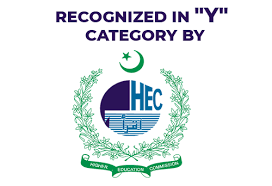Work-Family Positive Spillover and Mental Health of Married Special Education Professionals
Abstract
 Abstract Views: 185
Abstract Views: 185
The current study aims to examine the relationship between work-family positive spillover and mental health of special education professionals. For this purpose, correlation research design was used. Purposive sampling method was used to recruit 200 married professionals working in private special education institutions of Lahore. Assessment was carried out using multi-dimensional scale of work-family positive spillover and Mental Health Continuum-Short Form (MHC-SF). Pearson Product Moment Correlation and Linear Regression were employed to analyze the data. A significant positive relationship of work to family positive spillover with social wellbeing and psychological wellbeing of the participants was found. Similarly, a positive relationship of family to work positive spillover with social wellbeing and psychological wellbeing of the participants was also found. Overall, it was concluded that a positive association of work and family roles with each other improves the social and psychological wellbeing of special education professionals.
Downloads
References
Avais, M. A., Wassan, A., & Shah, S. (2014). A case study on problems of working women in city Sukkur. Academic Research International, 5(2), 325-333.
Barnett, R. C., & Hyde, J. S. (2000). Women, men, work, and family: An expansionist theory. American Psychologist, 56(10), 781–796. https://psycnet.apa.org/doi/10.1037/0003-066X.56 .10.781
Biggs, E. E., Gilson, C. B., & Carter, E. W. (2019). “Developing that balance”: Preparing and supporting special education teachers to work with paraprofessionals. Teacher Education and Special Education, 42(2), 117-131. https://doi.org/10.1177%2F0888406418765611
Demerouti, E., Derks, D., Lieke, L., & Bakker, A. B. (2014). New ways of working: Impact on working conditions, work–family balance, and well-being. In The impact of ICT on quality of working life (pp. 123-141). Springer, Dordrecht.
Dodanwala, T. C., & Shrestha, P. (2021). Work–family conflict and job satisfaction among construction professionals: the mediating role of emotional exhaustion. On the Horizon, 29(2), 62-75. http://dx.doi.org/10.1108/OTH-11-2020-0042
Edwards, J. R., & Rothbard, N. P. (2000). Mechanisms linking work and family: Clarifying the relationship between work and family constructs. Academy of Management Review, 25(1), 178–199. https://psycnet.apa.org/doi/10.2307/259269
Goode, W. J. (1960). A theory of role strain. American Sociological Review, 25, 483–496. https://psycnet.apa.org/doi/10.2307/2092933
Hammer, L. B., Kossek, E. E., Zimmerman, K., & Daniels, R. (2007). Clarifying the construct of family-supportive supervisory behaviors (FSSB): A multilevel perspective. In Exploring the work and non-work interface. Emerald Group Publishing Limited.
Hopkins, M., Bjorklund Jr, P., & Spillane, J. P. (2019). The social side of teacher turnover: Closeness and trust among general and special education teachers in the United States. International Journal of Educational Research, 98, 292-302. https://doi.org/10. 1016/j.ijer.2019.08.020
Iqbal, F., Ahmad, M. B., Rai, I. H., Aslam, S., & Hafiz, F. A. (2020). Time Poverty among Working Females in Pakistan: A Qualitative Study. International Journal of Economics and Financial Issues, 10(4), 170-175. https://doi.org/10.32479/ijefi.10251
Karim, J., Bibi, Z., & Aftab, F. (2016). The moderating role of religiosity on the relationship between satisfaction with work-life balance and job satisfaction. IBT Journal of Business Studies, 12(1), 157-167
Katz, D., & Kahn, R. (1978). The social psychology of organizations (2nd ed.). New York: Wiley.
Khursheed, A., Mustafa, F., Arshad, I., & Gill, S. (2019). Work-family conflict among married female professionals in Pakistan. Management Studies and Economic Systems, 4(2), 123-130.
Kirchmeyer, C. (1993). Nonwork-to-work spillover: a more balanced view of the experiences and coping of professional women and men. Sex Roles, 28(9-10), 531-52.
Lamers, S. M., Westerhof, G. J., Bohlmeijer, E. T., ten Klooster, P. M., & Keyes, C. L. (2011). Evaluating the psychometric properties of the mental health continuum‐short form (MHC‐SF). Journal of Clinical Psychology, 67(1), 99-110. https://doi.org/10.1002/jclp.20741
Leung, Y. K., Mukerjee, J., & Thurik, R. (2020). The role of family support in work-family balance and subjective well-being of SME owners. Journal of Small Business Management, 58(1), 130-163. https://doi.org/10.1080/00472778.2019.1659675
Mukhtar, A., Faiz, R., & Asad, H. (2020). Work-Life Interface of Pakistani Women Entrepreneurs: An Exploratory Study. Pakistan Journal of Social Sciences (PJSS), 40(2), 1063-1074.
Obrenovic, B., Jianguo, D., Khudaykulov, A., & Khan, M. A. S. (2020). Work-family conflict impact on psychological safety and psychological well-being: A job performance model. Frontiers in Psychology, 11, 475. https://doi.org/10.3389/fpsyg.2020.00475
Sánchez-Núñez, M. T., García-Rubio, N., Fernández-Berrocal, P., & Latorre, J. M. (2020). Emotional intelligence and mental health in the family: The influence of emotional intelligence perceived by parents and children. International Journal of Environmental Research and Public Health, 17(17), 6255. https://doi.org/10.3390/ijerph17176255
Sieber, S. D. (1974). Toward a theory of role accumulation. American Sociological Review, 39, 567–578. https://www.jstor.org/stable/2094422
Voydanoff, P. (2002). Linkages between the work–family interface and work, family and individual outcomes. Journal of Family Issues, 23, 138–164. https://doi.org/10.1177%2F0192513X02023001007








